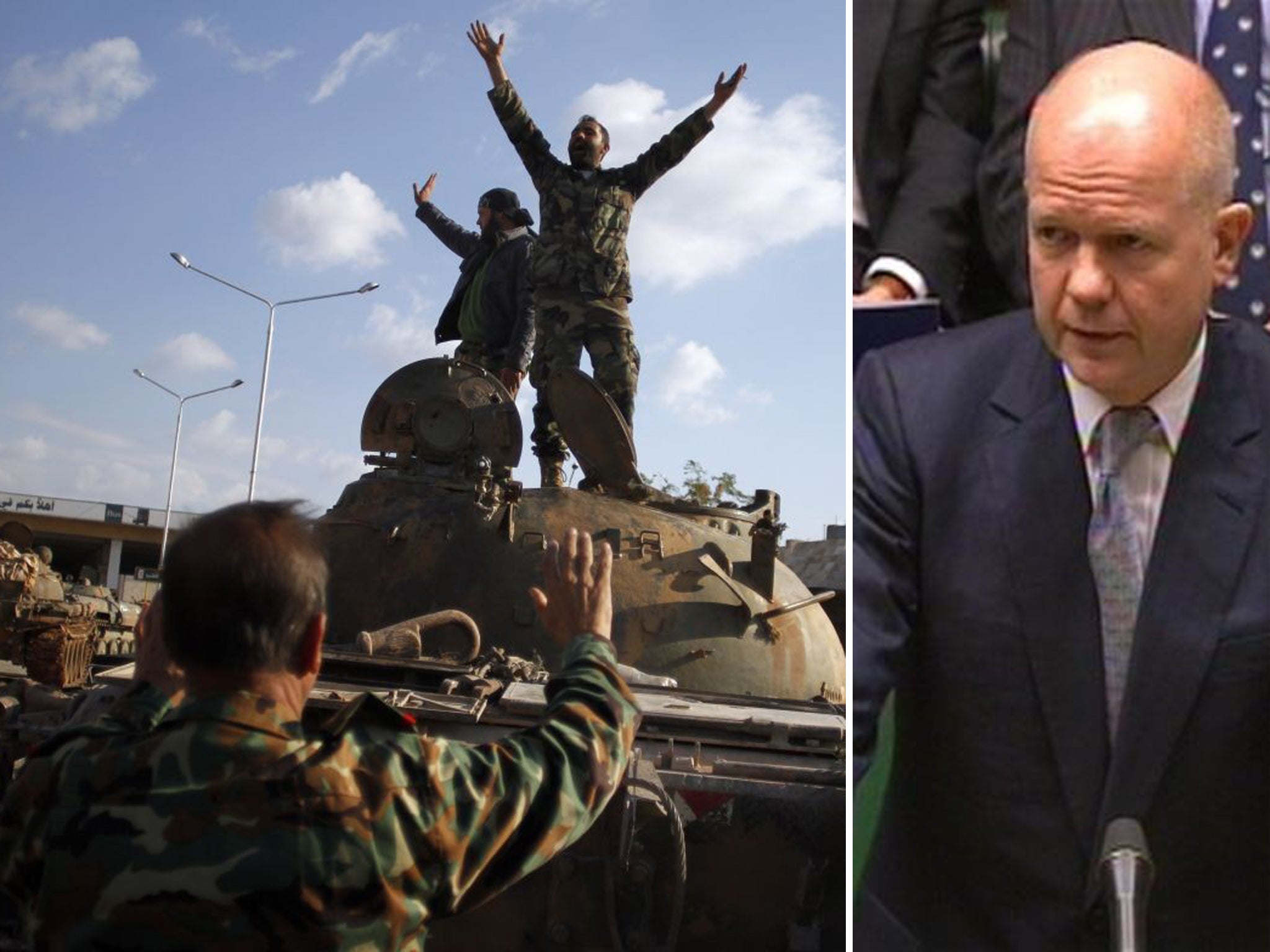William Hague: UK recognises and will support Syrian rebel group in fight against Assad

Your support helps us to tell the story
From reproductive rights to climate change to Big Tech, The Independent is on the ground when the story is developing. Whether it's investigating the financials of Elon Musk's pro-Trump PAC or producing our latest documentary, 'The A Word', which shines a light on the American women fighting for reproductive rights, we know how important it is to parse out the facts from the messaging.
At such a critical moment in US history, we need reporters on the ground. Your donation allows us to keep sending journalists to speak to both sides of the story.
The Independent is trusted by Americans across the entire political spectrum. And unlike many other quality news outlets, we choose not to lock Americans out of our reporting and analysis with paywalls. We believe quality journalism should be available to everyone, paid for by those who can afford it.
Your support makes all the difference.Britain is to offer support to a coalition of Syrian rebels after recognising it as the “sole legitimate representative” of the Syrian people, Foreign Secretary William Hague announced today.
The decision to recognise the National Coalition of the Syrian Revolutionary and Opposition Forces - bringing together opponents of President Bashar Assad's discredited regime - follows a meeting between Mr Hague and the alliance's leaders on Friday.
In a statement to the Commons today, Mr Hague said the group's assurances had been "encouraging".
"It is strongly in the interests of Syria, of the wider region and of the United Kingdom that we support them and deny space to extremist groups," he said.
"On the basis of the assurances I received and my consultation with European partners yesterday, Her Majesty's Government has decided to recognise the National Coalition of the Syrian Revolutionary and Opposition Forces as the sole legitimate representative of the Syrian people."
Mr Hague said the coalition had promised to leave the door open to other opposition groups which wanted to join them, to appeal to Syrians from all communities and to be a "moderate political force committed to democracy" that would not repeat President Assad's abuses.
The Foreign Secretary told MPs the Government would press them to uphold their commitments while also offering them practical support.
The coalition will be invited to have a political representative in the UK, and there will be assistance for the opposition in setting up political and humanitarian structures, he said.
A £1 million package of communications support will be provided, possibly including mobile internet hubs and satellite phones.
A "stabilisation response team" will be sent to the region to help the coalition meet basic needs in areas held by opposition forces.
International Development Secretary Justine Greening was also looking at increasing British assistance to Syrians affected by the conflict, he said.
The opposition alliance was formed from Syria's disparate opposition groups at a meeting in Doha earlier this month.
Mr Hague condemned the "barbaric violence" of the Assad regime against its own people, 30,000 of whom have been killed so far and 400,000 who are now refugees in neighbouring countries.
A political transition was urgently needed and the establishment of the coalition was a "major breakthrough".
"A credible alternative to the Assad regime is emerging that has the growing support of the Arab League, the European Union, the United States and an increasing number of other countries; and we have an agreed basis for a transition in the form of the Geneva Communique which all permanent members of the United Nations Security Council signed up to in June," he said.
"But in the absence of that political and diplomatic solution, we will not rule out any option in accordance with international law that might save innocent lives in Syria and prevent the destabilisation of a region that remains critical to the security of the United Kingdom and the peace of the whole world."
Mr Hague refused to rule out of the prospect of Britain arming the rebels directly, although at present he said there had been no decision to change policy.
"We rule out no options. It is the job of the National Security Council to look at all options, particularly as this crisis worsens," he said.
"It is foolish to rule out options when we don't know how those situations will proceed."
PA
Join our commenting forum
Join thought-provoking conversations, follow other Independent readers and see their replies
Comments